Module 11 Unit 3 Language in use . 课件(共32张PPT,内嵌音频) 2023-2024学年外研版英语八年级上册
文档属性
| 名称 | Module 11 Unit 3 Language in use . 课件(共32张PPT,内嵌音频) 2023-2024学年外研版英语八年级上册 |
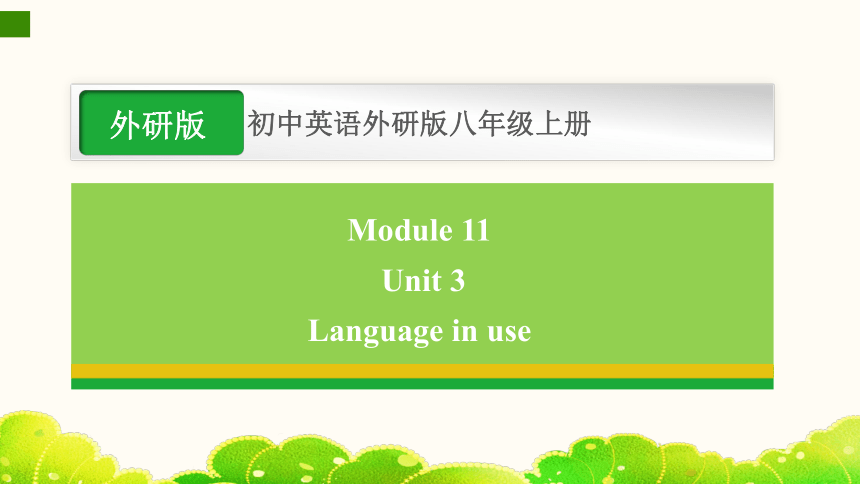
|
|
| 格式 | pptx | ||
| 文件大小 | 10.0MB | ||
| 资源类型 | 教案 | ||
| 版本资源 | 外研版 | ||
| 科目 | 英语 | ||
| 更新时间 | 2024-02-01 08:06:59 | ||
图片预览


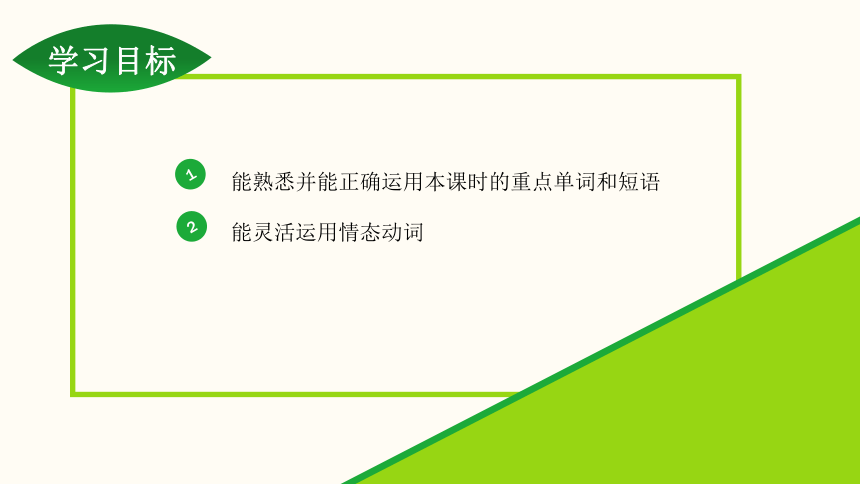
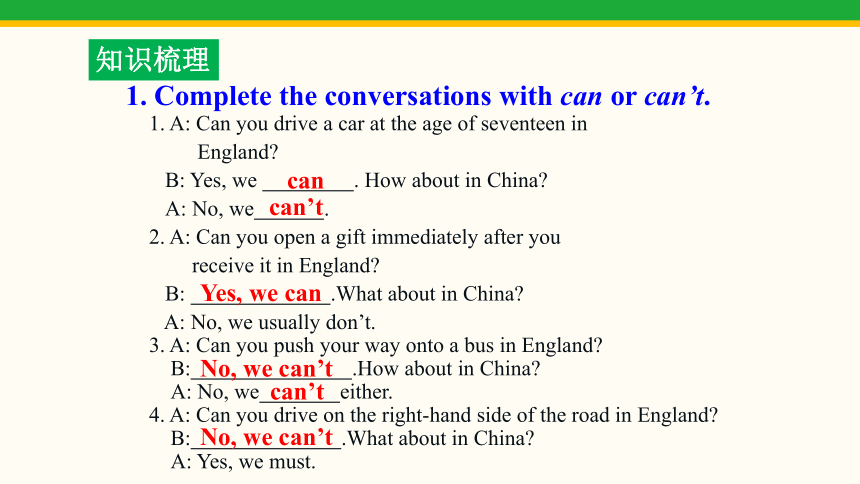
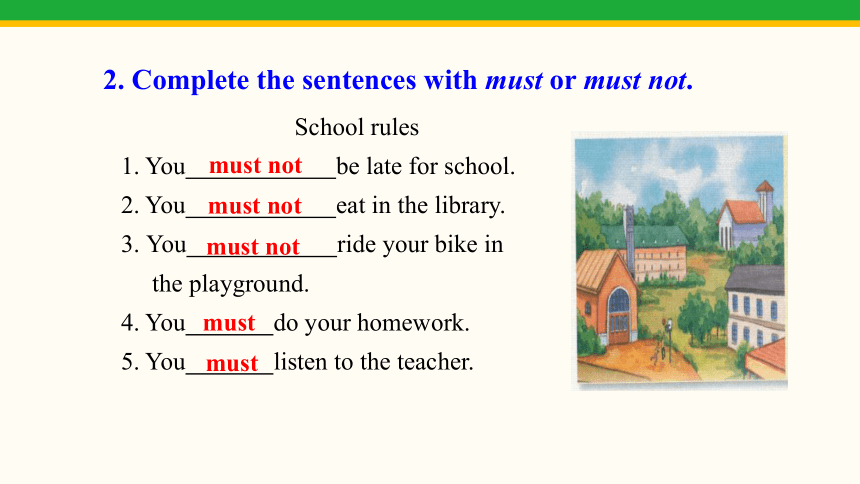

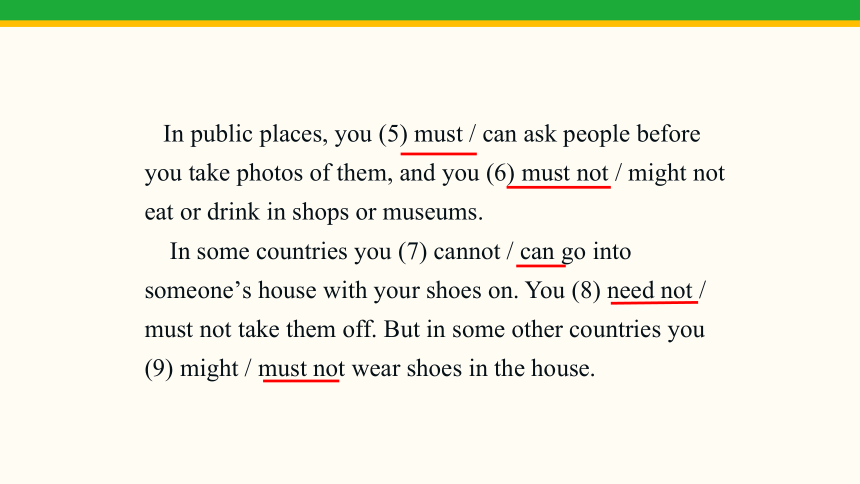
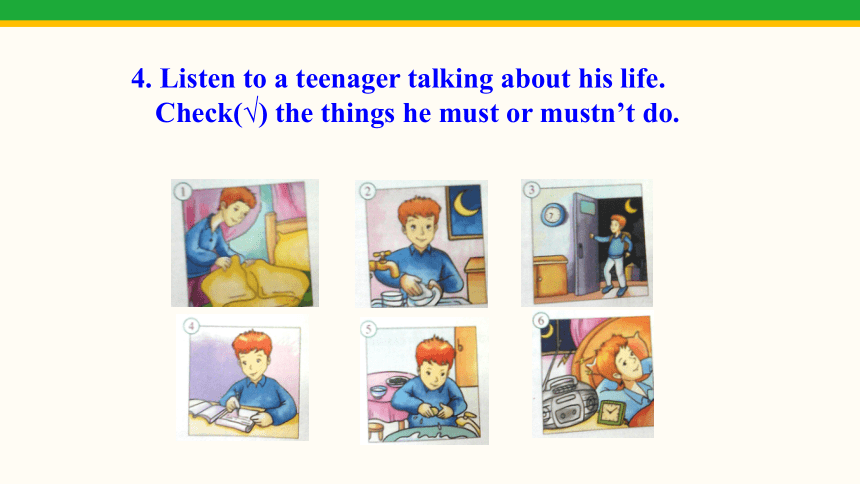
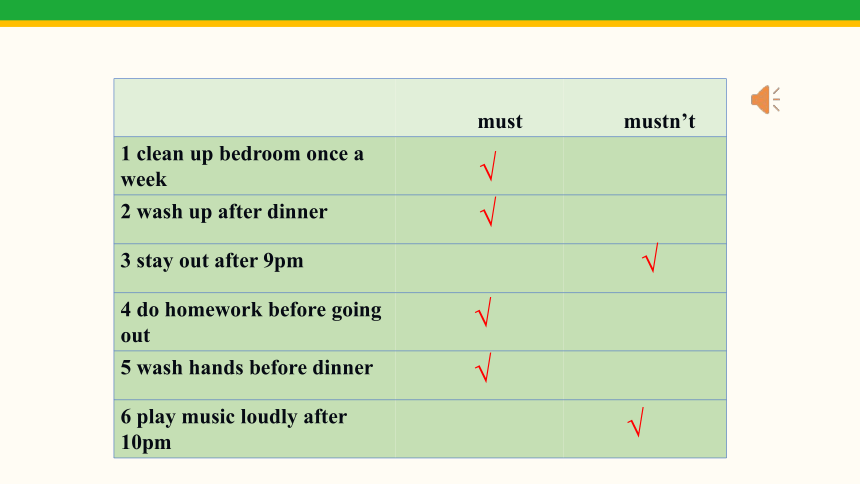
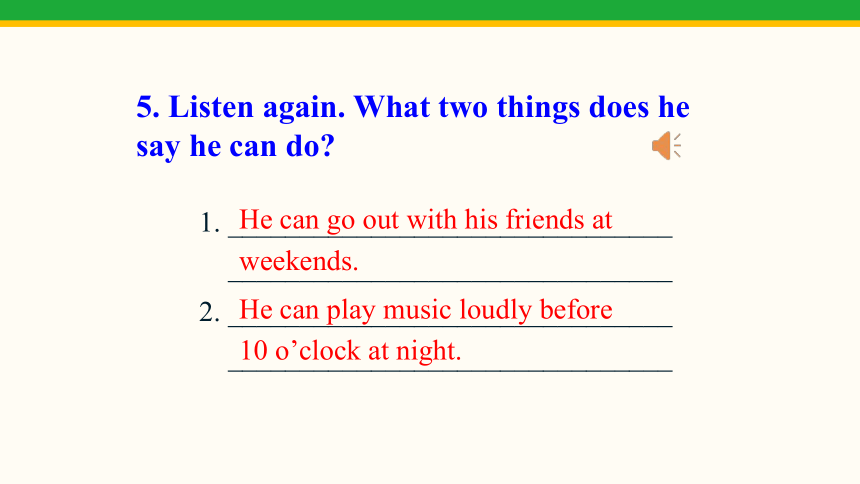
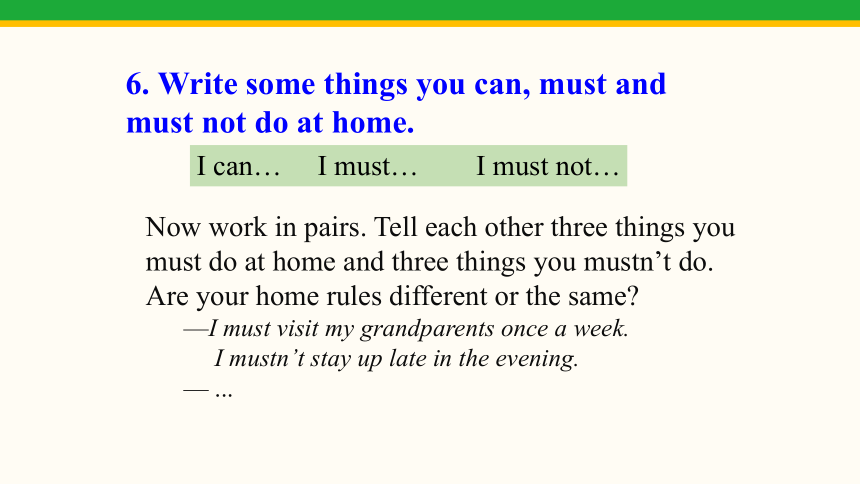
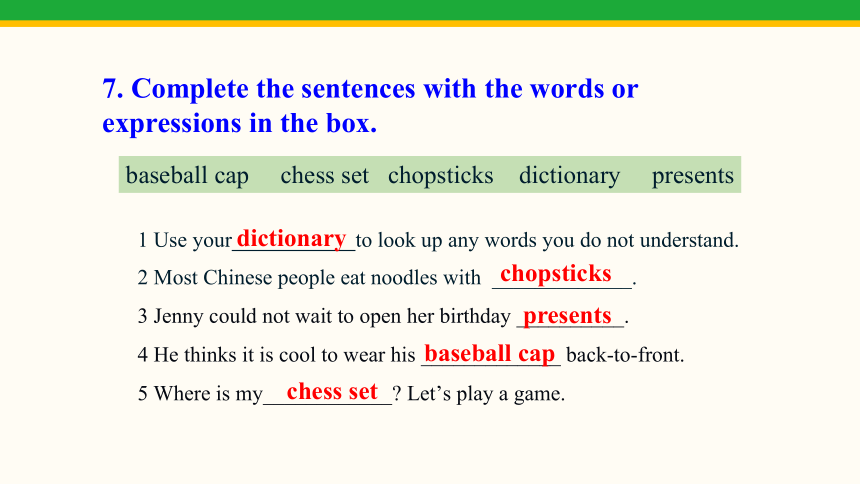
文档简介
(共32张PPT)
外研版
初中英语外研版八年级上册
Module 11
Unit 3
Language in use
新课导入
You _______ say Mr and Mrs when you meet someone for the first time.
You ______ take it away.
I _________ break anything.
You _________ wait!
Language practice
mustn’t
can
must
needn’t
用适当的单词补全句子。
1
2
能熟悉并能正确运用本课时的重点单词和短语
能灵活运用情态动词
知识梳理
1. A: Can you drive a car at the age of seventeen in
England
B: Yes, we . How about in China
A: No, we .
2. A: Can you open a gift immediately after you
receive it in England
B: .What about in China
A: No, we usually don’t.
3. A: Can you push your way onto a bus in England
B: .How about in China
A: No, we either.
4. A: Can you drive on the right-hand side of the road in England
B: .What about in China
A: Yes, we must.
1. Complete the conversations with can or can’t.
can
can’t
Yes, we can
No, we can’t
can’t
No, we can’t
2. Complete the sentences with must or must not.
School rules
1. You be late for school.
2. You eat in the library.
3. You ride your bike in
the playground.
4. You do your homework.
5. You listen to the teacher.
must not
must not
must not
must
must
3. Underline the correct words.
It is important to know what you must and must not do when you meet people from a different country.
You (1) may / must not ask Westerners “How old are you ” because it is not polite. You (2) might / can know someone well, but (3) you must / need not ask “How much money do you make ” He (4) may / can never speak to you again!
In public places, you (5) must / can ask people before you take photos of them, and you (6) must not / might not eat or drink in shops or museums.
In some countries you (7) cannot / can go into someone’s house with your shoes on. You (8) need not / must not take them off. But in some other countries you (9) might / must not wear shoes in the house.
4. Listen to a teenager talking about his life. Check(√) the things he must or mustn’t do.
must
mustn’t
1 clean up bedroom once a week
2 wash up after dinner
3 stay out after 9pm
4 do homework before going out
5 wash hands before dinner
6 play music loudly after 10pm
√
√
√
√
√
√
1. _______________________________
_______________________________
2. _______________________________
_______________________________
5. Listen again. What two things does he say he can do
He can go out with his friends at
weekends.
He can play music loudly before
10 o’clock at night.
6. Write some things you can, must and must not do at home.
Now work in pairs. Tell each other three things you must do at home and three things you mustn’t do. Are your home rules different or the same
—I must visit my grandparents once a week.
I mustn’t stay up late in the evening.
— ...
I can… I must… I must not…
7. Complete the sentences with the words or expressions in the box.
baseball cap chess set chopsticks dictionary presents
1 Use your to look up any words you do not understand.
2 Most Chinese people eat noodles with _____________.
3 Jenny could not wait to open her birthday __________.
4 He thinks it is cool to wear his _____________ back-to-front.
5 Where is my____________ Let’s play a game.
dictionary
chopsticks
presents
baseball cap
chess set
8. Play a game.Choose a word or an expression from the box and describe it to the class. The class guesses what it is.
baseball cap bike chess set chocolate chopsticks dictionary fish and chips litter photo video game
A: Many people have one.
B: Is it a chess set
A: No, You use it to get
to places.
C: Is it a bike
A: Yes.
Around the world
Traditional presents
In the West, people often take flowers
when they visit someone. Different flowers
have different meanings. For example, people
often give red roses to someone they love.
In Greece, you must not give white flowers because that means that someone is dead.
When you go to a foreign country, it is always best to check what people usually do, so you do not make mistakes.
9. Write some advice for foreign visitors to a Chinese family. Think about:
What must they wear
What mustn’t they talk about
What can’t they do
What presents can they bring
When must they arrive
…
10. Work in groups. Show the advice you wrote in Activity 9 to your group members. Choose two best pieces of advice.
11. Show the advice your group chose in Activity 10 to the whole class. Put the pieces of advice together to
form the advice of the whole class.
12. Then send your advice to your foreign friends or post it on your class blog.
1. You need not take them off. But in some other countries you must not wear shoes in the house.
(1) take off 脱掉。它是动副型短语,宾语是名词时,可放在take与off之间或off之后;宾语是代词时,必须放在take与off之间。
例:You must take off your shoes before you go into the room in Japan.
在日本,你进入房间前必须脱掉鞋。
(2)【辨析】wear与put on
wear侧重指穿的状态,意为“穿/戴着”,可用于穿衣、戴眼镜、戴项链等。put on意为“穿上”,强调穿衣服的动作。
例:Mary wears a red skirt and I want to put on my red skirt, too.
玛丽穿着红裙子,我也想穿上我的红裙子。
重难句探究
2. stay out after 9 pm
stay out待在外面;不在家中
e.g. I like to stay out on Sundays.
星期天我喜欢待在户外。
【拓展】 ①stay in待在家里;不外出
例:I don’t want to go anywhere but to stay in.
我只想待在家里,哪儿也不想去。
②stay up熬夜
例:It’s not a good habit to stay up.
熬夜不是一个好习惯。
活动小结
通过以上的活动,我们可以知道:
take off 脱掉。它是动副型短语,宾语是名词时,可放在take与off之间或off之后;宾语是代词时,必须放在take与off之间。
stay out待在外面;不在家中
①stay in待在家里;不外出
②stay up熬夜
探究二
1. must 的用法。
(1)表示主观的义务和必要,主要用于肯定句和疑问句,意为 “必须……,得……,要……”;由must构成的一般疑问句,肯定回答要用must,否定回答要用needn’t,意思是“不必”;
情态动词 must, can, need, had better
must的否定形式 mustn’t表示禁止,意思是“不能,不允许”。如:
—Must I finish the task right now
我必须现在就完成任务吗?
—No,you needn’t.不,你不需要。
You mustn’t come here without permission.
没有允许你不准来这里。
(2)表示肯定的猜测,常用于肯定句中,意为
“一定是,必然……”。如:
He must be reading newspapers in the reading room now.
他现在肯定正在阅读室看报纸。
2. can的用法
can的否定形式为cannot,缩写为can’t。
(1)表示能力
如:I can’t swim.
我不会游泳。
【注意】can表示能力可与be able to互换使用,且后者有更多的时态,be able to常被用来表示can所不能表示的将来或完成的概念。
They will be able to run this machine on their own in three months. 他们将在未来的3个月自己操作这个机器。
(2)表示可能性,意为“可以,可能”。如:
That big cinema can sit 2,000 people.
那个大影院可以坐2000人。
(3)表示允诺,意为“可以,能够”。如:
You can have the book when I have finished it.
在我读完这本书后,你可以看。
(4)表示惊异、不相信、猜测等(用于疑问句、否定句或感叹句中),意为“会,可能”。如:
This can’t be true. 这不可能是真的。
3. need的用法
need作为情态动词表示“需要”,可用于肯定句、否定句和疑问句。否定形式needn’t比较常用,表示“不需要”或“不必要”。
如:You needn’t wait.
你不需要等待。
【注意】need也可以作为行为动词,表示“需要”,常用need to do sth.结构。如:
I need to clean my room immediately.
我需要立即打扫我的屋子。
4. had better的用法
(1) had better表示劝告或建议,意为“最好……”。如:
You’d better speak in a low voice.
你最好低声说话。
(2) had better 一般不用于疑问句中,但可用于否定句中,
其否定形式为 had better not。如:
You’d better not go out before you finish your homework.
在你完成家庭作业之前,最好不要出去。
活动小结
通过以上的活动,我们可以知道:
1. must 的用法。
2. can的用法
3. need的用法
4. had better的用法
当堂检测
一、句型转换,每空一词。
1. I must clean my room now.(改为否定句)
I ________ clean my room now.
2. —Must I get to school before seven o’clock (作否定回答)
—______,you __________.
3. —Need I bring a map to the school?(作否定回答)
—______,you ________.
4. —Can I have a look at your new watch (作否定回答)
—Sorry, you _______.
5. You must wear a suit when you go to a party.(对画线部分提问)
______ ______ I wear when I go to a party
needn’t
No needn’t
No needn’t
can’t
What must
重点短语:
take off
wear/put on
stay/out/in/up
情态动词 must, can, need, had better
Module 11 Unit 3
外研版
初中英语外研版八年级上册
Module 11
Unit 3
Language in use
新课导入
You _______ say Mr and Mrs when you meet someone for the first time.
You ______ take it away.
I _________ break anything.
You _________ wait!
Language practice
mustn’t
can
must
needn’t
用适当的单词补全句子。
1
2
能熟悉并能正确运用本课时的重点单词和短语
能灵活运用情态动词
知识梳理
1. A: Can you drive a car at the age of seventeen in
England
B: Yes, we . How about in China
A: No, we .
2. A: Can you open a gift immediately after you
receive it in England
B: .What about in China
A: No, we usually don’t.
3. A: Can you push your way onto a bus in England
B: .How about in China
A: No, we either.
4. A: Can you drive on the right-hand side of the road in England
B: .What about in China
A: Yes, we must.
1. Complete the conversations with can or can’t.
can
can’t
Yes, we can
No, we can’t
can’t
No, we can’t
2. Complete the sentences with must or must not.
School rules
1. You be late for school.
2. You eat in the library.
3. You ride your bike in
the playground.
4. You do your homework.
5. You listen to the teacher.
must not
must not
must not
must
must
3. Underline the correct words.
It is important to know what you must and must not do when you meet people from a different country.
You (1) may / must not ask Westerners “How old are you ” because it is not polite. You (2) might / can know someone well, but (3) you must / need not ask “How much money do you make ” He (4) may / can never speak to you again!
In public places, you (5) must / can ask people before you take photos of them, and you (6) must not / might not eat or drink in shops or museums.
In some countries you (7) cannot / can go into someone’s house with your shoes on. You (8) need not / must not take them off. But in some other countries you (9) might / must not wear shoes in the house.
4. Listen to a teenager talking about his life. Check(√) the things he must or mustn’t do.
must
mustn’t
1 clean up bedroom once a week
2 wash up after dinner
3 stay out after 9pm
4 do homework before going out
5 wash hands before dinner
6 play music loudly after 10pm
√
√
√
√
√
√
1. _______________________________
_______________________________
2. _______________________________
_______________________________
5. Listen again. What two things does he say he can do
He can go out with his friends at
weekends.
He can play music loudly before
10 o’clock at night.
6. Write some things you can, must and must not do at home.
Now work in pairs. Tell each other three things you must do at home and three things you mustn’t do. Are your home rules different or the same
—I must visit my grandparents once a week.
I mustn’t stay up late in the evening.
— ...
I can… I must… I must not…
7. Complete the sentences with the words or expressions in the box.
baseball cap chess set chopsticks dictionary presents
1 Use your to look up any words you do not understand.
2 Most Chinese people eat noodles with _____________.
3 Jenny could not wait to open her birthday __________.
4 He thinks it is cool to wear his _____________ back-to-front.
5 Where is my____________ Let’s play a game.
dictionary
chopsticks
presents
baseball cap
chess set
8. Play a game.Choose a word or an expression from the box and describe it to the class. The class guesses what it is.
baseball cap bike chess set chocolate chopsticks dictionary fish and chips litter photo video game
A: Many people have one.
B: Is it a chess set
A: No, You use it to get
to places.
C: Is it a bike
A: Yes.
Around the world
Traditional presents
In the West, people often take flowers
when they visit someone. Different flowers
have different meanings. For example, people
often give red roses to someone they love.
In Greece, you must not give white flowers because that means that someone is dead.
When you go to a foreign country, it is always best to check what people usually do, so you do not make mistakes.
9. Write some advice for foreign visitors to a Chinese family. Think about:
What must they wear
What mustn’t they talk about
What can’t they do
What presents can they bring
When must they arrive
…
10. Work in groups. Show the advice you wrote in Activity 9 to your group members. Choose two best pieces of advice.
11. Show the advice your group chose in Activity 10 to the whole class. Put the pieces of advice together to
form the advice of the whole class.
12. Then send your advice to your foreign friends or post it on your class blog.
1. You need not take them off. But in some other countries you must not wear shoes in the house.
(1) take off 脱掉。它是动副型短语,宾语是名词时,可放在take与off之间或off之后;宾语是代词时,必须放在take与off之间。
例:You must take off your shoes before you go into the room in Japan.
在日本,你进入房间前必须脱掉鞋。
(2)【辨析】wear与put on
wear侧重指穿的状态,意为“穿/戴着”,可用于穿衣、戴眼镜、戴项链等。put on意为“穿上”,强调穿衣服的动作。
例:Mary wears a red skirt and I want to put on my red skirt, too.
玛丽穿着红裙子,我也想穿上我的红裙子。
重难句探究
2. stay out after 9 pm
stay out待在外面;不在家中
e.g. I like to stay out on Sundays.
星期天我喜欢待在户外。
【拓展】 ①stay in待在家里;不外出
例:I don’t want to go anywhere but to stay in.
我只想待在家里,哪儿也不想去。
②stay up熬夜
例:It’s not a good habit to stay up.
熬夜不是一个好习惯。
活动小结
通过以上的活动,我们可以知道:
take off 脱掉。它是动副型短语,宾语是名词时,可放在take与off之间或off之后;宾语是代词时,必须放在take与off之间。
stay out待在外面;不在家中
①stay in待在家里;不外出
②stay up熬夜
探究二
1. must 的用法。
(1)表示主观的义务和必要,主要用于肯定句和疑问句,意为 “必须……,得……,要……”;由must构成的一般疑问句,肯定回答要用must,否定回答要用needn’t,意思是“不必”;
情态动词 must, can, need, had better
must的否定形式 mustn’t表示禁止,意思是“不能,不允许”。如:
—Must I finish the task right now
我必须现在就完成任务吗?
—No,you needn’t.不,你不需要。
You mustn’t come here without permission.
没有允许你不准来这里。
(2)表示肯定的猜测,常用于肯定句中,意为
“一定是,必然……”。如:
He must be reading newspapers in the reading room now.
他现在肯定正在阅读室看报纸。
2. can的用法
can的否定形式为cannot,缩写为can’t。
(1)表示能力
如:I can’t swim.
我不会游泳。
【注意】can表示能力可与be able to互换使用,且后者有更多的时态,be able to常被用来表示can所不能表示的将来或完成的概念。
They will be able to run this machine on their own in three months. 他们将在未来的3个月自己操作这个机器。
(2)表示可能性,意为“可以,可能”。如:
That big cinema can sit 2,000 people.
那个大影院可以坐2000人。
(3)表示允诺,意为“可以,能够”。如:
You can have the book when I have finished it.
在我读完这本书后,你可以看。
(4)表示惊异、不相信、猜测等(用于疑问句、否定句或感叹句中),意为“会,可能”。如:
This can’t be true. 这不可能是真的。
3. need的用法
need作为情态动词表示“需要”,可用于肯定句、否定句和疑问句。否定形式needn’t比较常用,表示“不需要”或“不必要”。
如:You needn’t wait.
你不需要等待。
【注意】need也可以作为行为动词,表示“需要”,常用need to do sth.结构。如:
I need to clean my room immediately.
我需要立即打扫我的屋子。
4. had better的用法
(1) had better表示劝告或建议,意为“最好……”。如:
You’d better speak in a low voice.
你最好低声说话。
(2) had better 一般不用于疑问句中,但可用于否定句中,
其否定形式为 had better not。如:
You’d better not go out before you finish your homework.
在你完成家庭作业之前,最好不要出去。
活动小结
通过以上的活动,我们可以知道:
1. must 的用法。
2. can的用法
3. need的用法
4. had better的用法
当堂检测
一、句型转换,每空一词。
1. I must clean my room now.(改为否定句)
I ________ clean my room now.
2. —Must I get to school before seven o’clock (作否定回答)
—______,you __________.
3. —Need I bring a map to the school?(作否定回答)
—______,you ________.
4. —Can I have a look at your new watch (作否定回答)
—Sorry, you _______.
5. You must wear a suit when you go to a party.(对画线部分提问)
______ ______ I wear when I go to a party
needn’t
No needn’t
No needn’t
can’t
What must
重点短语:
take off
wear/put on
stay/out/in/up
情态动词 must, can, need, had better
Module 11 Unit 3
同课章节目录
- Module 1 How to learn English
- Unit 1 Let's try to speak English as much as possi
- Unit 2 You should smile at her.
- Unit 3 Language in use .
- Module 2 My home town and my country
- Unit 1 It's taller than many other buildings.
- Unit 2 Cambridge is a beautiful city in the east o
- Unit 3 Language in use .
- Module 3 Sports.
- Unit 1 Nothing is more exciting than playing tenni
- Unit 2 This year we training more carefully.
- Unit 3 Language in use .
- Module 4 Planes, ships and trains .
- Unit 1 He lives the farthest from school.
- Unit 2 What is the best way to travel.
- Unit 3 Language in use .
- Module 5 Lao She Teahouse.
- Unit 1 I wanted to see the Beijing Opera.
- Unit 2 It descibes the changes in Chinese society.
- Unit 3 Language in use .
- Module 6 Animals in danger.
- Unit 1 It allows people to get closer to them .
- Unit 2 The WWF is working hard to save them all.
- Unit 3 Language in use .
- Revision module A
- Module 7 A famous story
- Unit 1 Alice was sitting with her sister by the ri
- Unit 2 She was thinking about her cat.
- Unit 3 Language in use .
- Module 8 Accidents
- Unit 1 While the car were changing to red, a car s
- Unit 2 I was trying to pick it up when it bite me
- Unit 3 Language in use .
- Module 9 Population
- Unit 1 The population of China is about 1.37 billi
- Unit 2 Arnwick was a city with 200,000 people.
- Unit 3 Language in use .
- Module 10 The weathe
- Unit 1 It might snow.
- Unit 2 The weather is fine all year round.
- Unit 3 Language in use .
- Module 11 Way of life
- Unit 1 In China ,we open a gift later.
- Unit 2 In England, you usually drink tea with milk
- Unit 3 Language in use .
- Module 12 Help
- Unit 1 What should we do before help arrives?
- Unit 2 Stay away from windows and heavy furniture.
- Unit 3 Language in use .
- Revision module B
